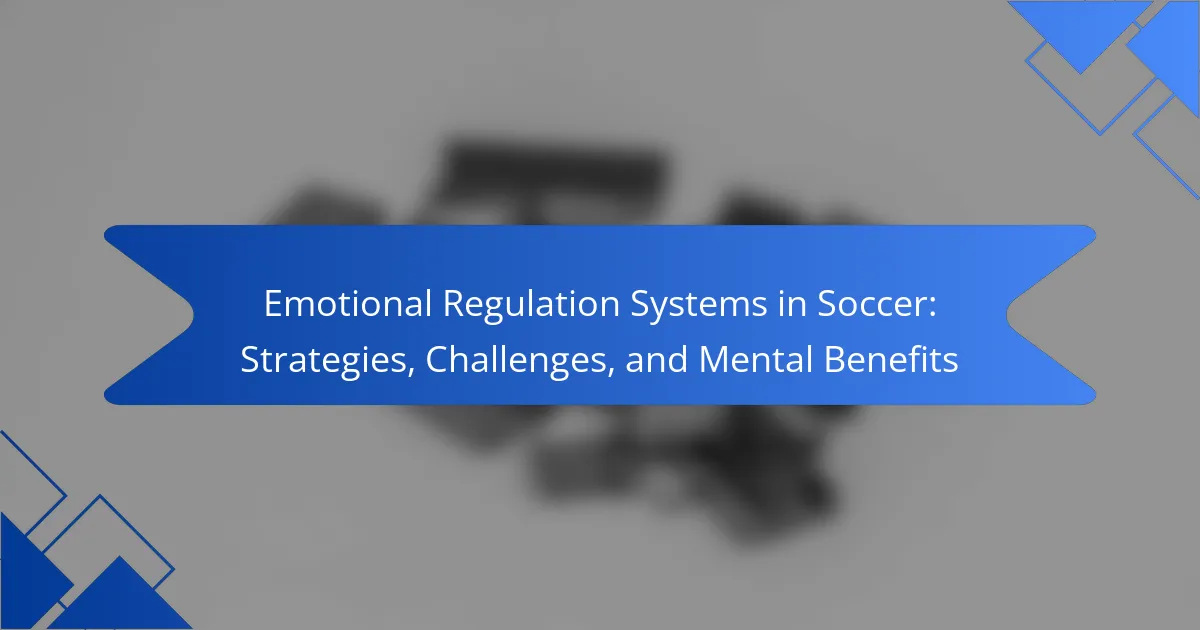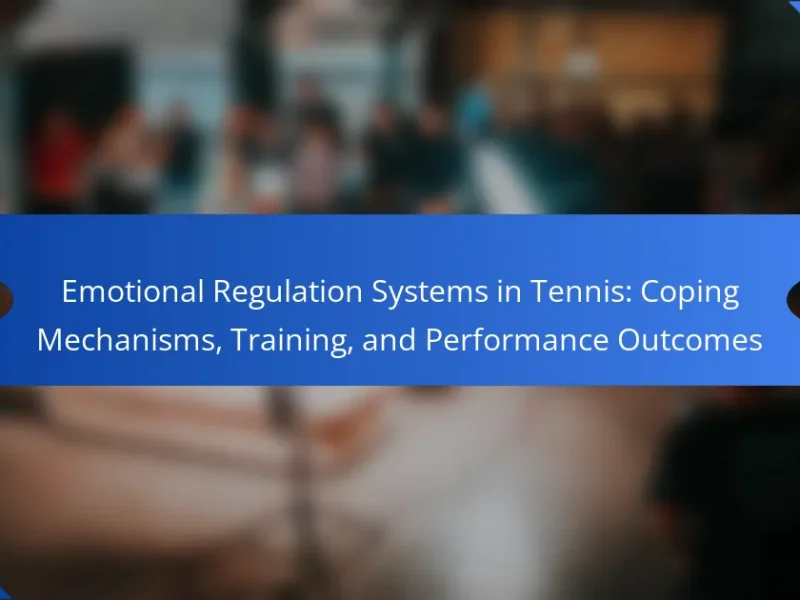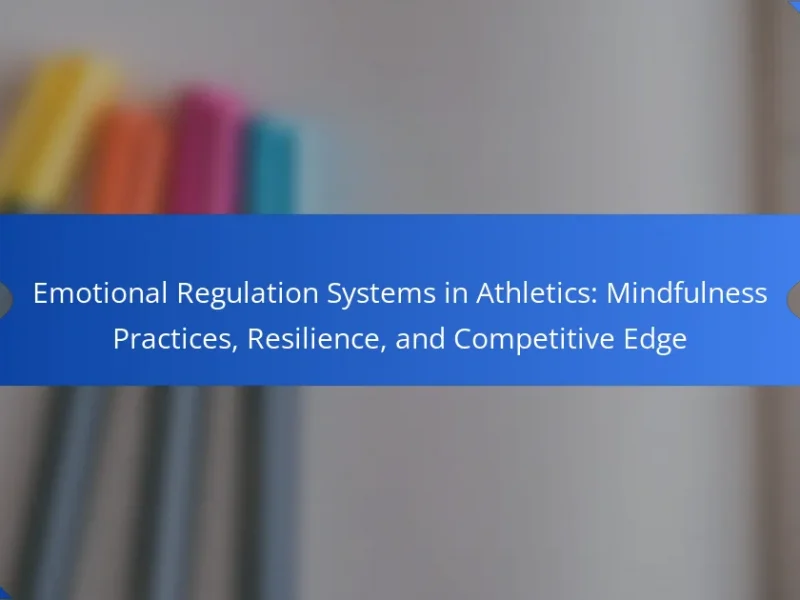Managing emotions effectively can enhance soccer performance and mental well-being. This article explores strategies like mindfulness and self-talk, challenges faced during high-pressure situations, and the mental benefits of emotional regulation. Key practices for players include developing self-awareness and utilising relaxation techniques to maintain focus and resilience on the field.
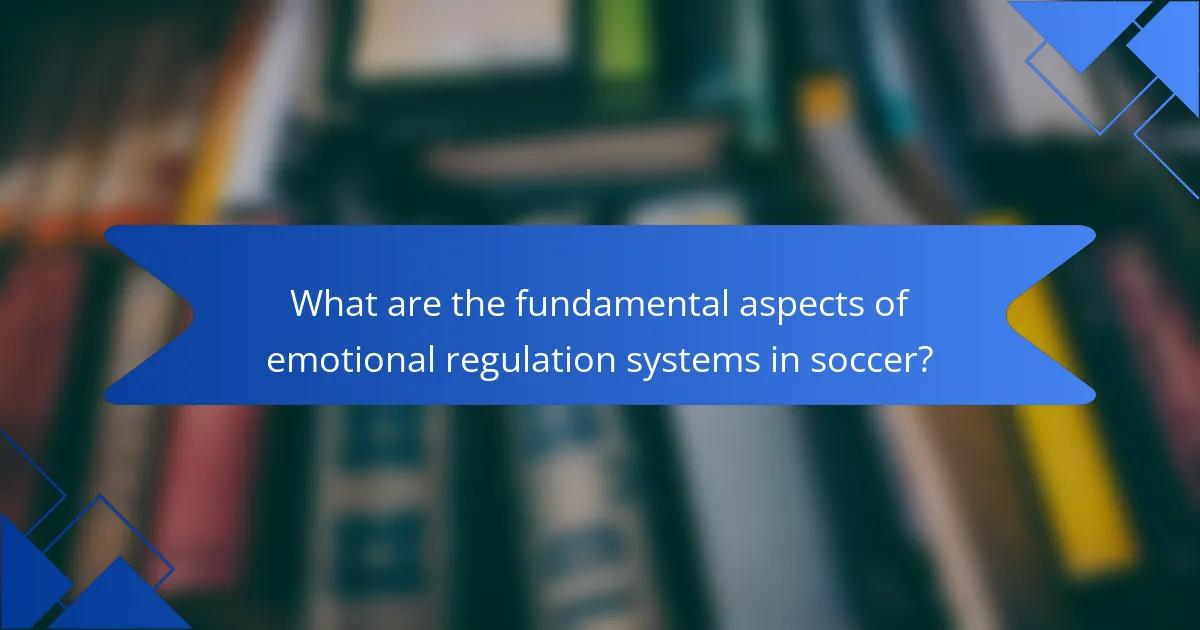
What are the fundamental aspects of emotional regulation systems in soccer?
Emotional regulation systems in soccer focus on managing players’ emotions to enhance performance. These systems involve strategies such as mindfulness, self-talk, and emotional awareness. Challenges include pressure from competition and maintaining composure during high-stakes moments. Mental benefits encompass improved focus, resilience, and team cohesion, ultimately leading to better game outcomes.
How do emotional regulation systems impact player performance?
Emotional regulation systems significantly enhance player performance by improving focus and resilience. Effective emotional management allows players to maintain composure during high-pressure situations, leading to better decision-making and teamwork. For example, athletes trained in emotional regulation exhibit higher levels of concentration, resulting in improved game outcomes. Furthermore, developing these systems can mitigate the impact of stress and anxiety, fostering a more positive mental state that boosts overall performance.
What role does emotional intelligence play in soccer?
Emotional intelligence significantly enhances soccer performance by improving players’ emotional regulation. It helps athletes manage stress, maintain focus, and foster teamwork. High emotional intelligence can lead to better decision-making during high-pressure situations, ultimately benefiting team dynamics and individual performance. Players with strong emotional skills can adapt to challenges, enhancing their resilience on the field.
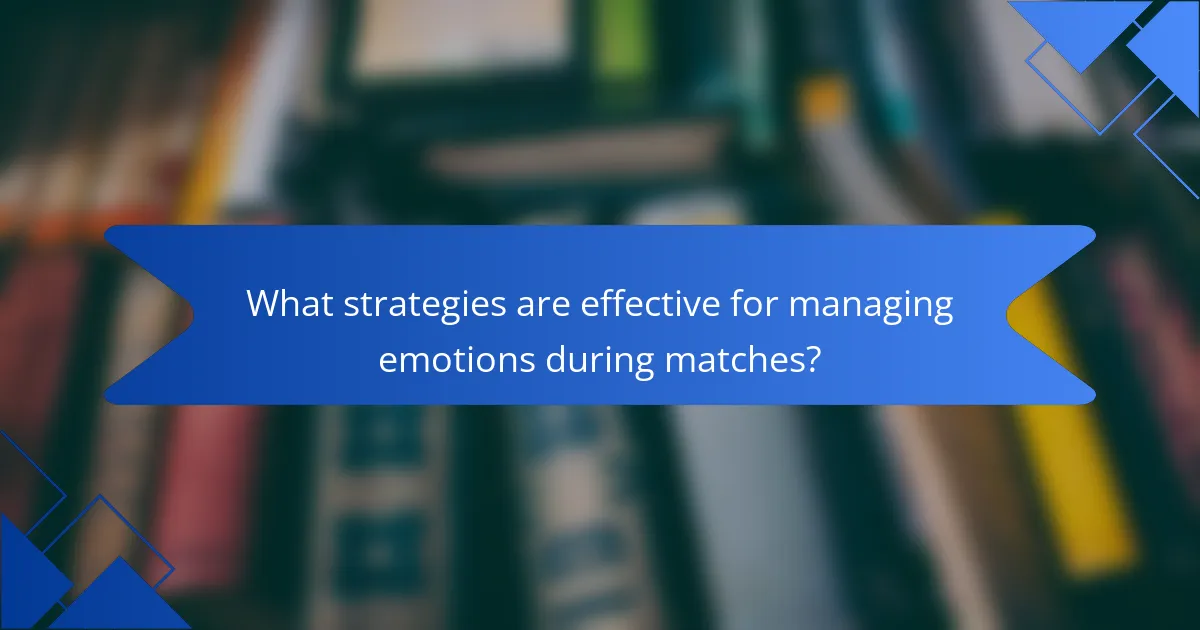
What strategies are effective for managing emotions during matches?
Effective strategies for managing emotions during matches include mindfulness techniques, deep breathing exercises, and positive self-talk. These methods help players maintain focus and composure, reducing anxiety and enhancing performance. Mindfulness allows athletes to stay present, while deep breathing regulates physiological responses. Positive self-talk fosters confidence and resilience, critical for overcoming challenges on the field. Embracing these strategies leads to improved emotional regulation and mental benefits, enhancing overall game performance.
How can players utilise breathing techniques for emotional control?
Players can utilise breathing techniques to enhance emotional control during soccer matches. Controlled breathing reduces anxiety and promotes focus, enabling players to maintain composure under pressure. Techniques such as deep diaphragmatic breathing can lower heart rates and create a sense of calm, which is crucial for optimal performance. Regular practice of these techniques contributes to improved mental resilience and emotional stability on the field.
What specific breathing exercises are recommended?
Breathing exercises such as diaphragmatic breathing, box breathing, and 4-7-8 breathing are recommended for emotional regulation in soccer. These techniques help players manage stress and enhance focus during games. Diaphragmatic breathing promotes relaxation by engaging the diaphragm, while box breathing aids concentration through a structured inhalation and exhalation pattern. The 4-7-8 method encourages calmness by extending the breath cycle. Regular practice of these exercises can improve mental resilience and performance on the field.
What cognitive strategies help in emotional regulation?
Cognitive strategies that aid in emotional regulation include mindfulness, cognitive reframing, and self-talk. Mindfulness enhances awareness of emotions, allowing for better management. Cognitive reframing helps in viewing situations differently, reducing negative emotional responses. Self-talk promotes positive internal dialogue, fostering resilience. These strategies collectively improve performance and mental well-being in soccer.
How does visualization aid in emotional management?
Visualization significantly enhances emotional management by improving focus and reducing anxiety. Athletes can mentally rehearse scenarios, which prepares them for real-game situations. This practice fosters confidence and emotional resilience, crucial for performance. Additionally, visualization allows players to process emotions, leading to better regulation during high-pressure moments.
What role does team support play in emotional regulation?
Team support plays a crucial role in emotional regulation by providing players with a sense of belonging and shared responsibility. This support fosters resilience during high-pressure situations in soccer, enhancing mental well-being. Positive interactions among teammates can reduce anxiety and improve focus, leading to better performance on the field. Additionally, collective emotional experiences can create a supportive environment that encourages open communication and coping strategies.
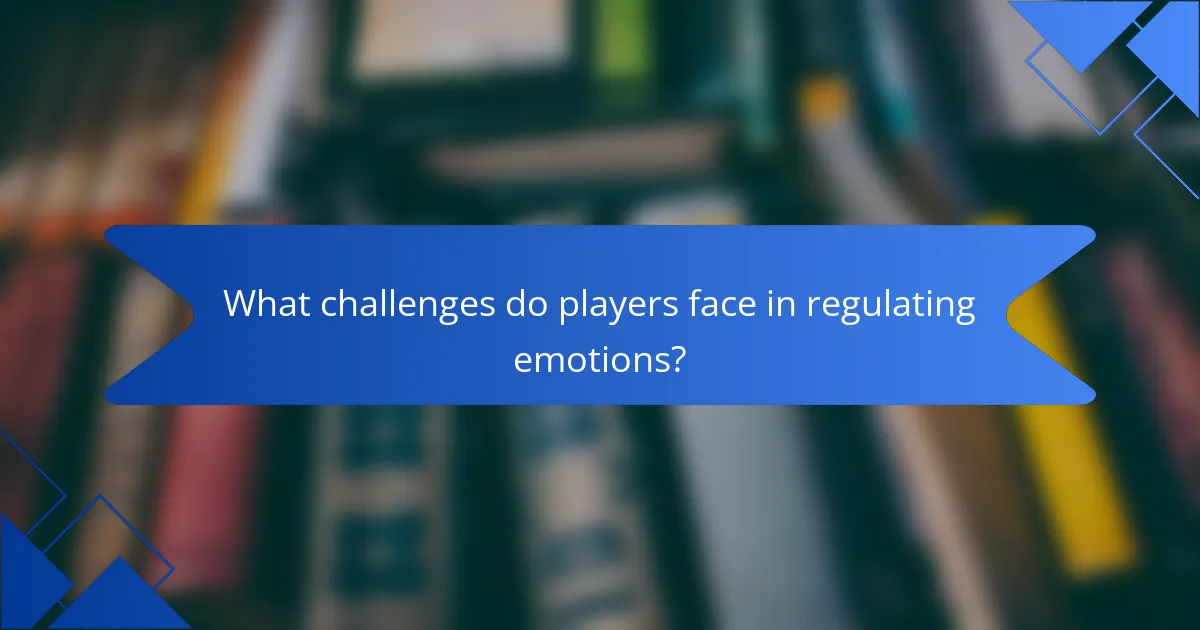
What challenges do players face in regulating emotions?
Players face challenges in regulating emotions due to high-pressure situations, intense competition, and the need for immediate decision-making. These factors can lead to anxiety, frustration, or loss of focus. Additionally, lack of emotional support and coping strategies can exacerbate these challenges. Developing emotional regulation skills is essential for improving performance and mental well-being in soccer.
How do high-pressure situations affect emotional responses?
High-pressure situations can heighten emotional responses significantly. In soccer, athletes often face intense stress, which can lead to anxiety or excitement. Effective emotional regulation strategies, such as mindfulness and visualization, can help players manage these responses. These techniques enhance focus, improve performance, and foster resilience under pressure.
What are common emotional pitfalls in competitive soccer?
Common emotional pitfalls in competitive soccer include anxiety, frustration, and overconfidence. These emotions can hinder performance and decision-making on the field. Anxiety often arises from high-stakes situations, leading to decreased focus. Frustration can stem from mistakes or perceived unfairness, impacting teamwork and morale. Overconfidence may result in underestimating opponents, leading to poor preparation and execution. Recognising and addressing these emotional challenges is crucial for enhancing mental resilience and overall performance in soccer.
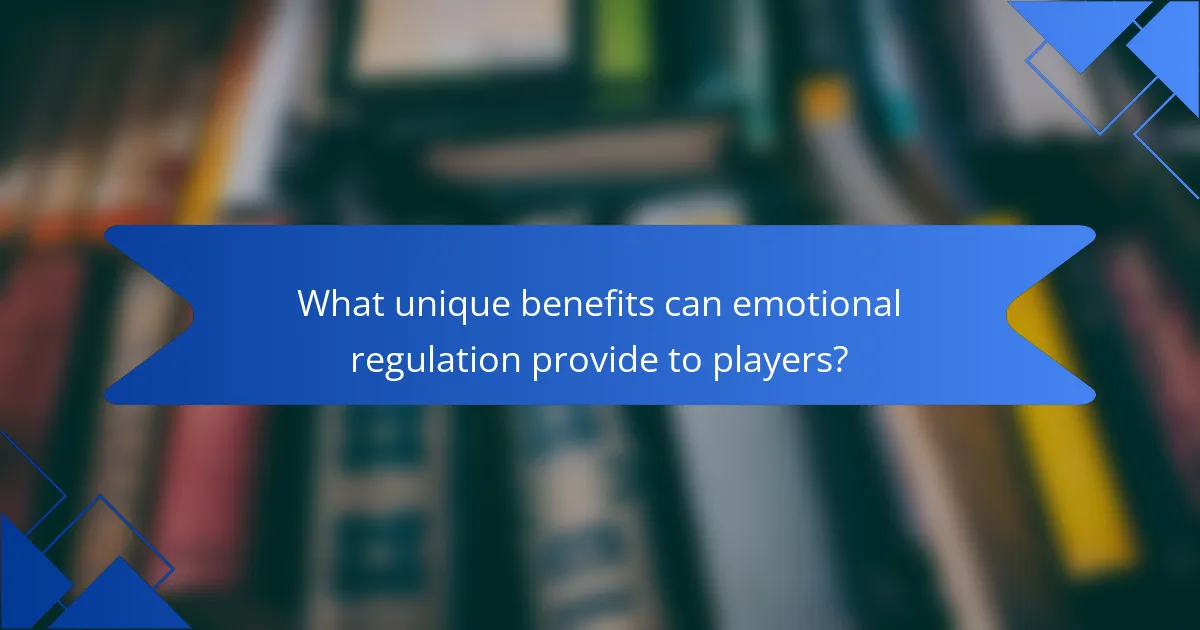
What unique benefits can emotional regulation provide to players?
Emotional regulation provides players with enhanced focus, improved decision-making, and resilience under pressure. These benefits lead to better performance and increased mental well-being. For example, players who effectively manage emotions can maintain composure during high-stakes situations, reducing the likelihood of mistakes. Additionally, emotional regulation fosters teamwork and communication, creating a positive environment that supports collective success.
How does emotional regulation contribute to mental resilience?
Emotional regulation enhances mental resilience by enabling individuals to manage stress and adversity effectively. This skill fosters adaptive coping strategies, allowing athletes to maintain focus during competitive pressures. Research indicates that players with strong emotional regulation report higher performance levels and improved well-being. Moreover, these individuals can rebound from setbacks more swiftly, demonstrating a unique attribute of resilience that is critical in high-stakes environments like soccer.
What positive effects does emotional regulation have on team dynamics?
Emotional regulation positively impacts team dynamics by enhancing communication, fostering trust, and improving conflict resolution. Effective emotional regulation allows team members to express feelings constructively, leading to a supportive environment. As a result, teams exhibit increased cohesion and collaboration, which can enhance overall performance. Additionally, players who manage emotions well contribute to a positive atmosphere, reducing stress and increasing motivation.
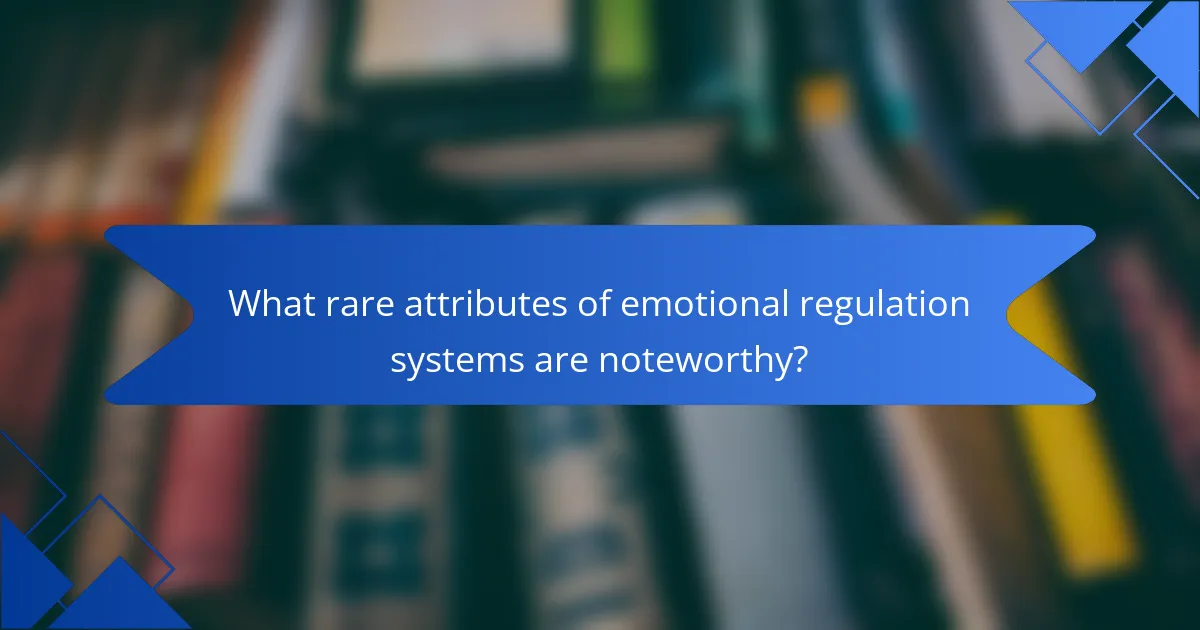
What rare attributes of emotional regulation systems are noteworthy?
Rare attributes of emotional regulation systems in soccer include resilience under pressure, adaptability to varying game dynamics, and the ability to maintain focus amidst distractions. These traits enable players to perform optimally, enhancing team cohesion and individual mental health. Such unique aspects contribute significantly to the overall psychological resilience required in competitive sports.
How do cultural differences influence emotional regulation in soccer?
Cultural differences significantly influence emotional regulation in soccer by shaping players’ responses to stress and teamwork. Players from collectivist cultures often prioritise group harmony, leading to more restrained emotional expressions. In contrast, those from individualistic cultures may exhibit more overt emotional displays, affecting team dynamics. Understanding these cultural nuances can enhance coaching strategies and improve team cohesion.
What innovative practices are emerging in emotional regulation?
Innovative practices in emotional regulation for soccer include mindfulness training, emotional intelligence development, and cognitive-behavioral techniques. These strategies enhance players’ mental resilience, improve focus, and reduce anxiety during high-pressure situations. Incorporating technology, such as biofeedback devices, allows athletes to monitor their emotional states in real-time, promoting self-awareness and regulation. Additionally, team workshops on communication and emotional support foster a positive environment, further aiding emotional regulation.
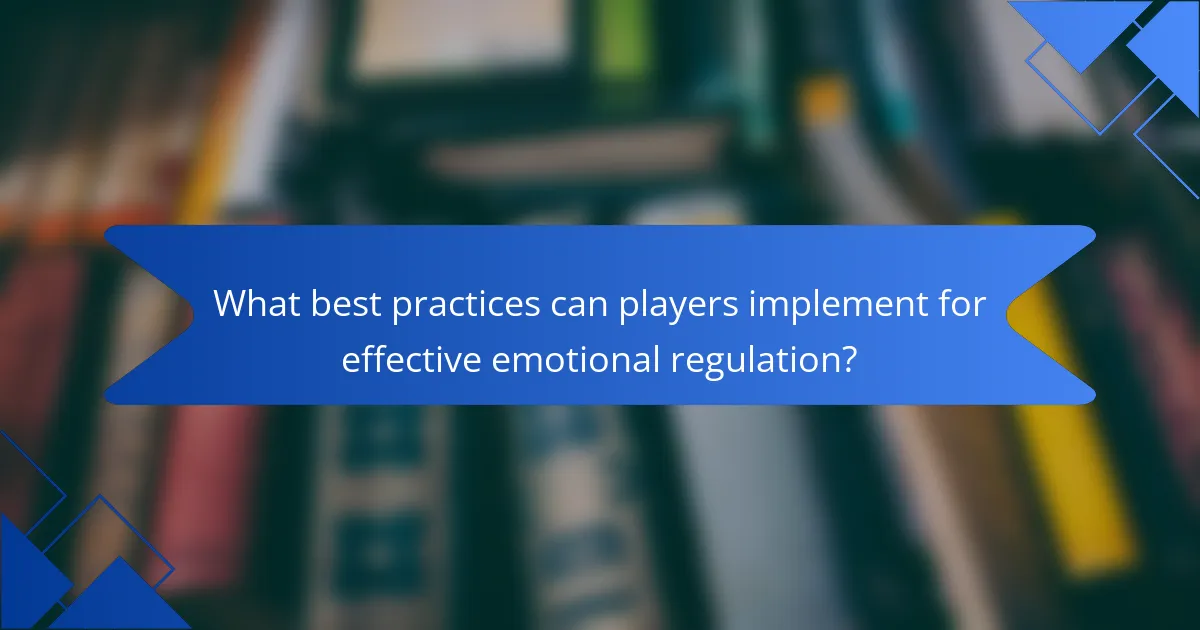
What best practices can players implement for effective emotional regulation?
Players can implement several best practices for effective emotional regulation. First, they should develop self-awareness to recognise their emotional triggers during games. Practising mindfulness techniques can help players stay present and manage stress. Additionally, setting realistic goals allows players to maintain focus and motivation. Utilising positive self-talk fosters a constructive mindset, while seeking support from teammates or coaches can enhance emotional resilience. Lastly, incorporating relaxation strategies, such as deep breathing or visualization, can significantly improve emotional control during high-pressure situations.
What common mistakes should players avoid in emotional management?
Players should avoid common mistakes like neglecting self-awareness, failing to communicate emotions, and underestimating the importance of mental breaks. These errors can hinder emotional regulation during games. Recognising emotions and discussing them with teammates fosters a supportive environment. Taking breaks helps reset focus, reducing anxiety and enhancing performance.
How can coaches support players in developing emotional regulation skills?
Coaches can support players in developing emotional regulation skills through targeted strategies. They can implement mindfulness techniques, helping players become aware of their emotions during games. Providing constructive feedback fosters a growth mindset, encouraging players to view challenges as opportunities. Additionally, creating a supportive team environment promotes open discussions about emotions, enhancing players’ resilience. Regular mental skills training can also equip players with tools to manage stress and anxiety effectively, leading to improved performance on the field.
